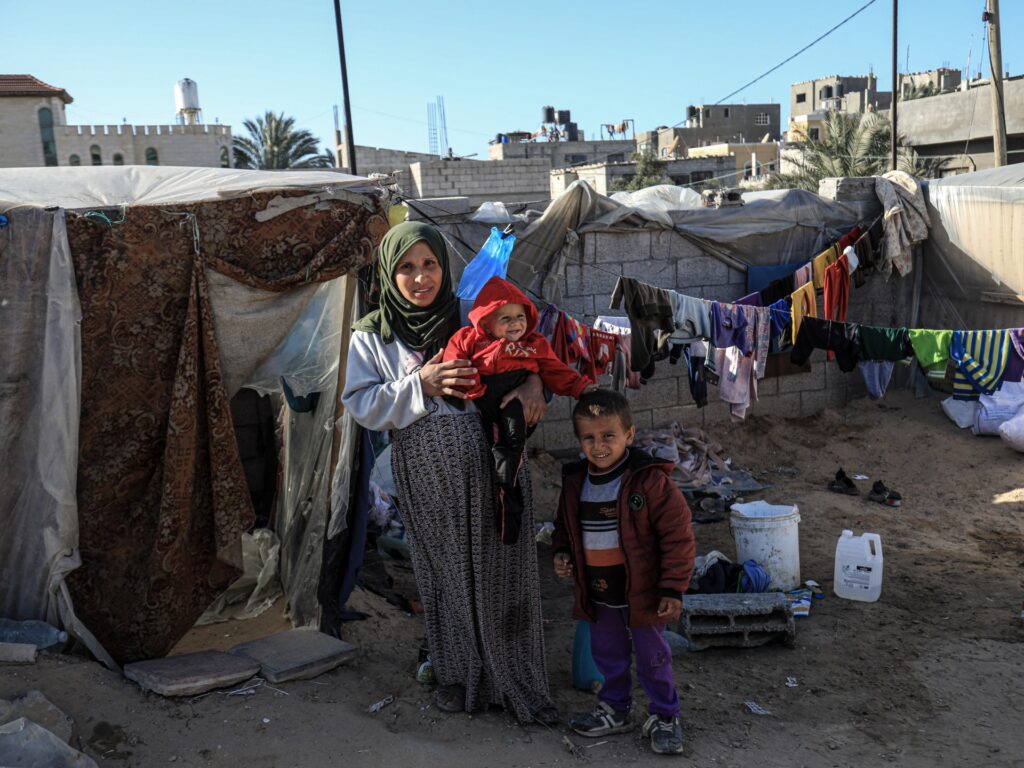Deir El Bala, Gaza Strip – Today, on International Women's Day, women in Gaza continue their daily struggle to survive and care for their children and families. Four women and their families who have been displaced by Israel's war in Gaza since October 7 spoke to Al Jazeera about their current lives.
“I've forgotten what it means to be a woman”: Nada Abdelsalam
Nada Abdelsalam, 34, sits next to her children in front of a tent, baking bread over a wood fire.
Nada says that since the war began, the constant demands of caring for her eight children from dawn to dusk in difficult conditions have made her forget about the passing days.
“Women in Gaza are bearing the brunt of this war. Our burdens have doubled and our sense of privacy has disappeared,” Nada said as she tended the fire and added bread.
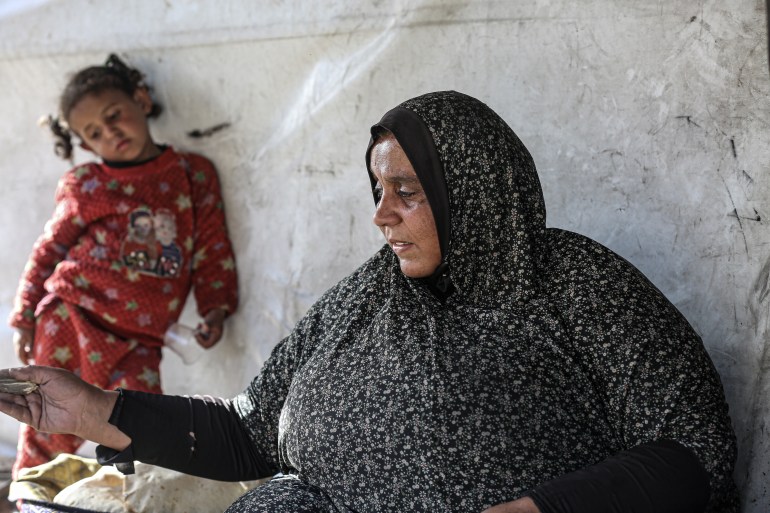
“I am now sitting on the street in a tent, deprived of the necessities of life. No water, no electricity, no toilets, no sanitation facilities. There is nothing,” she added.
Nada was forced to flee Gaza City's Magazi refugee camp to Deir el-Bala in central Gaza following Israel's evacuation order early in the war. Her house was bombed and destroyed.
“I came out with only the clothes I was wearing and the clothes of my children,” Nada says. “I never imagined I would get to this point. My closet used to be full of clothes.'' She says she is embarrassed to step out of her tent wearing old, shabby clothes.
“I wear a prayer robe for everything, including when I sleep and when I go out,” she added.
She says the war robbed Nada of more than just her home and property. She has also lost her sense of self.
“I have forgotten what it means to be a woman in this war. I feel decades older than I really am. My appearance reflects that.”
Nada is one of countless women in Gaza who have endured similar fatigue and burdens of responsibility during the ongoing war.
“Before the war, we bought bread at a bakery, washed our clothes in a washing machine, and lived in a clean, modern apartment,” Nada recalls. “Now we have regressed to Stone Age methods, baking bread on open fires and washing laundry by hand.
“This is suffering that no woman would wish on.”
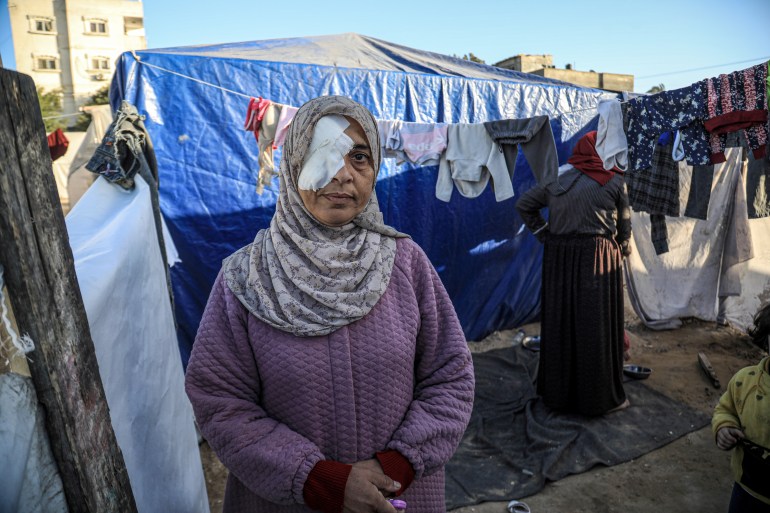
“This war requires a great deal of female power”: Sawsan Alzein
In a nearby tent, 50-year-old Sawsan Alzein sits with his female relatives. The mother of eight was seriously injured and lost an eye when her home on Salah al-Din Street, east of Gaza City, was bombed in the first week of the war.
“The day we heard the news of the war, we were sitting normally, and suddenly I realized that I was lying there covered in blood,” she recalls.
“At the hospital, I was told that my eye was seriously injured and it was immediately removed. I currently only have one eye, but I still need to complete treatment overseas. I also injured my hand and can't move it. .”
The family was evacuated to Deir El Bala about five months ago after one of her daughters and son-in-law were killed in a bombing.
“Losing my eyes had a huge impact on my psychology,” Sosan said. “I used to be the breadwinner of the family and like any mother, I was responsible for managing everything big and small, but now I struggle with basic household chores. Due to my injury, I have to cook over an open fire. I can't do things or carry things.”
Despite her daughter's help, Sawsan laments the impact her injury has had on her daily life.
“My children used to love my cooking, but now they are limited because of their health,” she says.
“Especially in a situation like this, it takes a lot of strength from mothers and women to manage their families, and we can't do that right now.”
Sawsan's only hope is that the war ends soon so he can return to his hometown in northern Gaza, even if it is in ruins.
“Living in the evacuation zone is difficult, especially for injured women like me who need special care,” says Sousan.
“We suffer in the simplest aspects of life. Our privacy as women is eroded. Our hearts are heavy with the loss of loved ones and worry for our children. Enough of what happened.”
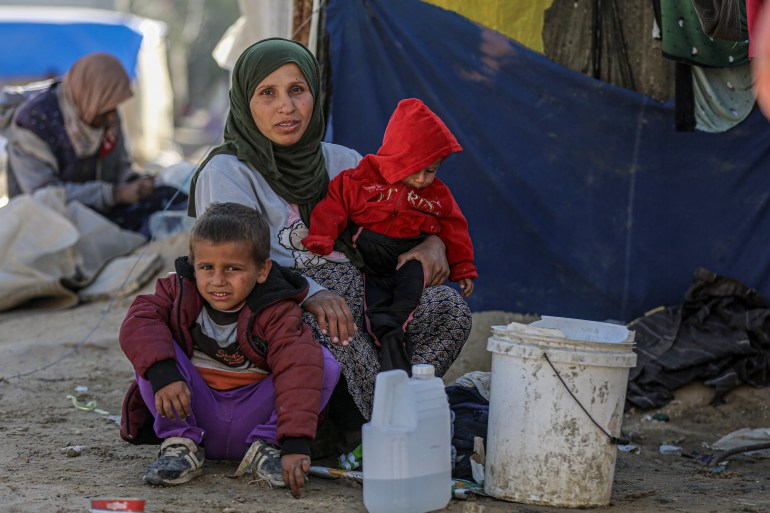
Scared of childbirth: Etemad Assaf
Etemad Assaf, 29, sits on a stone outside his tent, washing his clothes by hand.
Etemade, a mother of two and eight months pregnant with her third child, is struggling to care for her family under these circumstances. She was evacuated from Jabalia refugee camp to Deir El Bala, and she looks forward to one day being able to return to her hometown.
“The war changed our lives,” she says, rubbing her clothes with her hands.
“I'm so tired that every night I feel like I'm about to give birth.”
“Do you understand? Is this an appropriate life for a pregnant woman? A tent, cold, outside air, and lack of the basic necessities of life?”
Etemad says she is unable to provide even the basics for her children.
“My 11-month-old daughter needs diapers, but diapers are expensive. We can barely afford food, and sometimes we don't have anything to eat at all,” Etemad says.
“My big concern right now is the impending birth and the dire situation around me, especially given what I'm hearing about the complete collapse of hospitals in Gaza.”
“The health system is collapsing. There is not even a proper place to rest after giving birth.”
Etemad says she never imagined how bad things would get. “Two days ago, I looked at myself in the mirror for the first time since then and was shocked at how his facial features had changed and how dark his skin had become from sitting in the sun.”
“I took care of myself, and my daily routine was to moisturize my skin and hands and take a shower before going to bed,” Etemad recalls. “Now those are distant dreams.”
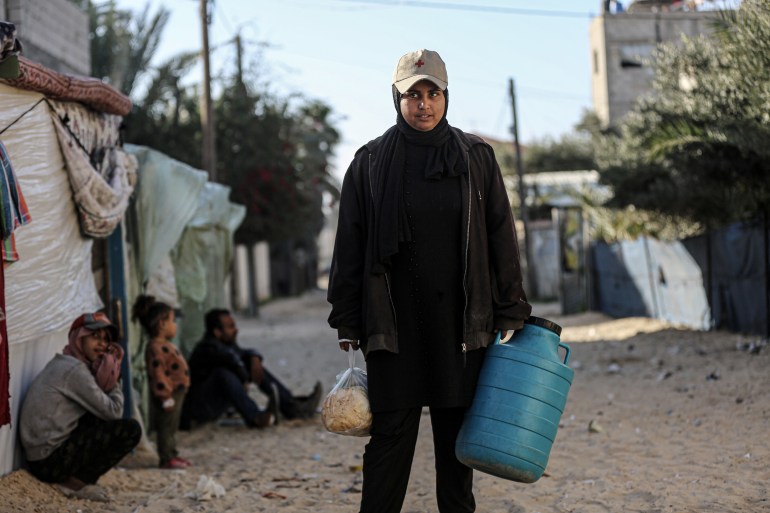
“All my dreams are gone”: Mara Alkaid
Mara Alkaid, 19, says the war stripped her of her femininity and forced her into roles she never imagined.
Mara says he feels like a man as he carries around heavy containers that he fills with water for his family multiple times a day.
“I completely forgot that I am a woman. I feel like I have become a boy,” said the woman who fled with her family from their home in the Zeitoun district, east of Gaza City, to the camp in Deir el-Balah. Mara says.
“I go out at dawn and line up in front of the bakery to deliver bread to nine families.” It's a similar story for all the other women and girls she knows here. “The war has forced us to abandon nature. Because of the lack of water, we sometimes go to the bakery without washing our faces.”
Before the war, Mara says she looked after herself like other girls and was never required to do “demanding housework.”
“I brushed my teeth, took care of myself, listened to music, went to college, studied photography. Now all my dreams are gone.
“He became very violent and very vocal.”
Despite these changes, Mara still clings to her dream of completing her studies and becoming a photographer.
“I advise girls to never give up on their dreams or their nature,” she says. “My life was forcibly changed beyond recognition.”
“I admire girls from before the war.”

